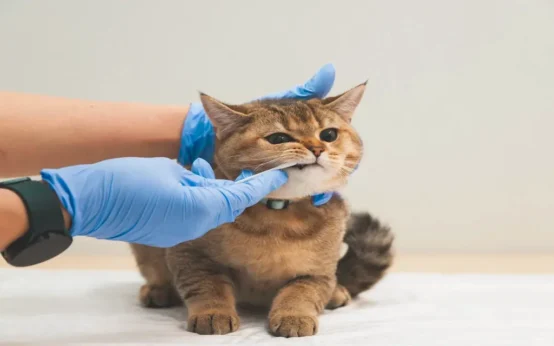Can a cat make you sick? The short answer is yes, but for most healthy people, the risk is low. Cats bring warmth, routine, and joy. They can, however, carry germs that sometimes pass to humans. The good news is simple habits protect you.
This guide explains the real risks without scare tactics. You will learn how germs spread, what common infections feel like, who needs extra care, and how to prevent problems at home. We will also touch on cat allergies and when to call a doctor or your vet.
If you are pregnant, you do not need to rehome your cat. You just need a few extra steps to stay safe. By the end, you will have clear examples, signs to watch for, and practical habits that work with a busy life. Let’s make can a cat make you sick a question you can answer with confidence.
Can a cat make you sick? Real risk, how germs spread, and what is normal
A zoonotic disease is a germ that passes from animals to people. Cats can carry some of these germs, even when they look healthy. Transmission usually happens through close contact, poor hygiene, or pests like fleas.
Here is how germs move from cats to people:
- Scratches and bites: Bacteria on the skin or in the mouth can enter through broken skin. Rough play raises the chance.
- Saliva: Licking a wound or broken skin can spread germs.
- Litter boxes: Feces can carry parasites or bacteria. Handling litter, or breathing dusty litter, raises exposure.
- Fleas: Fleas bite cats and can carry germs, then jump to people or other pets.
- Contaminated surfaces: Bowls, bedding, carriers, or grooming tools can spread germs if not cleaned.
Most cat owners stay well. Risk rises with poor hygiene, raw feeding, outdoor hunting, or a weak immune system. People on chemotherapy, very young children, older adults, and pregnant people need extra care. Even then, most issues are mild and manageable.
Pregnancy does not mean you must rehome a cat. Smart litter care, gloves, and good handwashing go a long way.
What this article covers next:
- What zoonotic disease means in plain English
- The common ways cats spread germs
- How common getting sick is
- The upsides of living with cats
- Common illnesses, what they feel like, and what to do
- Simple prevention steps that work
- Who is most at risk and when to seek help
What zoonotic disease means in plain English
Zoonotic means a germ can jump from animals to people. For example, a cat scratch can sometimes pass bacteria that cause swollen lymph nodes. That is it, plain and simple.
How cats spread germs: scratches, bites, litter boxes, and fur
- Scratches and bites break the skin, which lets bacteria in.
- Saliva can pass germs if a cat licks a cut.
- Litter boxes can expose you to parasites or bacteria when scooping.
- Fur and paws can carry germs from the litter box to other surfaces.
Handwashing after play and litter care, using toys for play, and safe handling lower the risk.
How common is getting sick from a cat?
It is uncommon for healthy people. Most cat-related illnesses are mild and treatable, like a simple skin infection or a short stomach bug. The risk is higher if your immune system is weak, you are very young or older, or you are pregnant. With clean habits and regular vet care, most households do fine.
The upsides of living with cats: stress relief and mental health
Cats can boost your mood, reduce stress, and offer steady companionship. Petting a purring cat often helps people feel calm. These benefits matter, and with a few safety steps, you can enjoy them while staying healthy.
Common illnesses from cats and what they feel like
Below is a quick, symptom-first overview. If something sounds familiar, reach out to a doctor or your vet. Most conditions are manageable when caught early.
Cat scratch disease (Bartonella): swollen nodes after a scratch
This often follows a scratch or bite, sometimes linked to fleas on cats. Signs include a small bump or blister at the scratch site, tender or swollen lymph nodes near that area, mild fever, fatigue, and headache. Most cases are mild. See a doctor for a high fever, worsening pain, or if you have a weak immune system. Antibiotics may be used when needed.
Ringworm from cats: the itchy ring-shaped rash
Ringworm is a fungus, not a worm. It spreads through touch, shared items, or spores in the home. It usually causes a circular, red, scaly patch with a clear center and mild itch. Vets and doctors can treat both the pet and the person. Clean surfaces and fabrics to stop spread, since spores can linger.
Toxoplasmosis from cat litter: why pregnancy needs extra care
Healthy adults often have no symptoms or mild flu-like signs, such as fatigue, swollen nodes, or low fever. The concern is bigger during pregnancy or with a weak immune system. You can get exposed from cat feces in litter or soil, and from raw or undercooked meat. Testing and prenatal advice can help. Safe litter handling lowers risk, which we cover below.
Worms and stomach bugs from cats: roundworms, Giardia, Salmonella
Intestinal parasites and bacteria can cause belly cramps, nausea, and diarrhea. They spread through contact with feces or contaminated surfaces. Raw meat diets and poor litter hygiene raise the risk. Talk to a doctor if you have severe diarrhea, dehydration, or lasting symptoms. We will cover prevention steps next.
Cat allergies and asthma: stuffy nose, itchy eyes, wheeze
Allergies are not infections. They are reactions to proteins in dander, saliva, and urine. Common symptoms include sneezing, nasal congestion, itchy eyes, and wheezing. Medication, air cleaning, and smart cleaning routines can help. An allergist or primary care doctor can outline options.
How to avoid getting sick from your cat: simple steps that work
You do not need a complex plan. A few steady habits make the biggest difference. Focus on clean hands, safe play, clean litter, parasite control, smart feeding, and regular vet care. Indoor life and up-to-date shots protect both you and your cat. Think of it like brushing your teeth, small steps, big payoff.
Litter box hygiene and handwashing that actually help
- Scoop daily, and bag waste right away.
- Do a full clean weekly, with hot soapy water, then rinse and dry.
- Use a scoop or wear gloves for litter duty, then wash hands.
- If litter dust bothers you, wear a simple mask while scooping.
- If you are pregnant, ask someone else to handle the litter. If that is not possible, wear gloves and wash hands after.
Bite and scratch safety for playtime and handling
- Use toys, not hands, for play, like wands or balls.
- Trim nails every 2 to 4 weeks, or ask a groomer or vet to help.
- Do not roughhouse. Stop play if your cat gets overstimulated.
- If you get scratched or bitten, wash the wound right away with soap and running water for several minutes.
- Pat dry, apply a clean bandage, and watch for redness, swelling, pus, or fever.
Flea, tick, and deworming plan with your vet
- Use monthly flea prevention year-round, as advised by your vet.
- Check for ticks after outdoor time or visits to areas with wildlife.
- Follow a deworming schedule, especially for kittens and outdoor cats.
- Flea control helps lower risk of Bartonella, the cause of cat scratch disease.
Keep cats indoors, up to date on shots, and away from wildlife
- Indoor cats have fewer injuries and fewer germs.
- Keep core vaccines current, including rabies where required.
- Schedule regular vet checkups to catch issues early.
- If your cat goes outside, use a breakaway collar and ID, and talk with your vet about extra vaccines or parasite prevention.
Smart food choices for cats: skip raw diets, clean bowls and water
- Avoid raw meat diets, which can carry Salmonella and Campylobacter.
- Wash food and water bowls daily with hot soapy water.
- Store pet food in clean, dry containers, and seal bags between uses.
- Change water at least once a day, more if the bowl gets dirty.
Who is most at risk and when to see a doctor or vet
Some people need extra care. If your immune system is weak, you are pregnant, you care for infants, or you are an older adult, use the safety steps and call for help sooner when sick. Doctors and vets can guide you through tests or treatment. If your cat seems ill, call your vet early. If you have fever, a spreading rash, a painful wound, or lasting stomach issues, call your doctor.
Bring the right details to speed things up. Time of exposure, how it happened, and your cat’s health records matter. Early help prevents bigger problems, and most cases are easy to treat.
Pregnant or planning pregnancy: how to lower toxoplasma risk
- Avoid litter if you can. If you must scoop, wear gloves and wash hands after.
- Change litter daily, since the parasite takes time to become infectious.
- Do not handle raw meat without care. Wash hands, knives, and boards after cooking.
- Talk with your prenatal provider about testing and safety tips.
- You can keep your cat. Good hygiene is the key.
Babies and young kids: extra hygiene and safe play tips
- Keep litter boxes out of reach, and never in play areas.
- Teach gentle play using toys, not hands.
- Clean any scratch or bite right away.
- Cover sandboxes so stray cats do not use them as a bathroom.
- Supervise play with pets until children learn safe handling.
Older adults and people with weak immune systems: stay cautious
- Avoid rough play and deep scratches or bites.
- Wear gloves for litter duty or cleanup, then wash hands.
- Call your doctor sooner for fever, swollen lymph nodes, or skin redness after an injury.
- Keep up with your cat’s vet visits, vaccines, and parasite control.
- Consider keeping your cat indoors to reduce exposure.
After a bite or a deep scratch: tetanus, rabies risk, and urgent care
- Wash the wound with soap and running water for several minutes.
- Check your tetanus shot status. You may need a booster if it has been more than 5 to 10 years, or as your clinician advises.
- Seek care for deep wounds, punctures, signs of infection, or any bite from an unknown or unvaccinated cat.
- Rabies in cats is rare, but it is deadly. If a bite involves a stray or wild animal exposure, get urgent evaluation.
What to tell your doctor and your vet for faster help
Bring clear details:
- When the exposure happened and the type of exposure, like scratch, bite, lick on a cut, or litter contact
- Symptoms and when they started
- Your cat’s vaccine status, flea and tick prevention, and any deworming
- Whether your cat eats raw food or goes outdoors
- Any travel, wildlife contact, or new pets in the home
- Photos of rashes, wounds, or swelling
Conclusion
So, can a cat make you sick? Yes, but the risk is low for healthy people, and you can cut it even further with good habits. Keep it simple and steady: wash hands, use toys for play, keep up with litter care, use flea control, see the vet regularly, and call a doctor if you have fever, a worsening wound, or lasting stomach issues. Small steps protect you and your cat. Enjoy the purrs, the quiet company, and the daily joy of living with a cat, with safety built into your routine.
Related post: How to Train Cat to Not Bite (Step-by-Step Guide)
FAQ:
Can a cat actually make you sick?
Yes. Cats can carry germs that pass to people, called zoonotic diseases. Most are mild and preventable with basic hygiene, vet care, and safe handling.
What illnesses can you get from cats?
Common ones include cat scratch disease (Bartonella), ringworm, toxoplasmosis, and intestinal parasites. Bites can spread Pasteurella. Less often, Salmonella or Campylobacter cause stomach illness.
What is cat scratch disease?
It is a bacterial infection from Bartonella henselae. A scratch or bite can cause a swollen lymph node, fever, and fatigue. It usually clears with time, but some people need antibiotics.
Can I get ringworm from my cat?
Yes. Ringworm is a fungus, not a worm. It causes round, itchy skin patches. It spreads by contact with fur or contaminated items. A vet can treat the cat, and you can treat your skin with antifungals.
Is toxoplasmosis a real risk from cats?
Yes, but risk is often overstated. Cats shed Toxoplasma oocysts in feces for a short time after first infection. Most human cases come from undercooked meat or unwashed produce. Litter box care still matters.
I’m pregnant. Should I avoid my cat?
You can keep your cat. Avoid cleaning the litter box if possible. If you must do it, wear gloves, scoop daily, and wash hands well. Do not eat undercooked meat, which poses higher risk than cat contact.
Can I catch a cold or flu from my cat?
Human cold viruses do not come from cats. Cats get their own respiratory viruses. Rare flu transmission from people to cats has occurred, not the other way around in typical household settings.
Are kittens riskier than adult cats?
Yes. Kittens are more likely to carry Bartonella and ringworm. They also scratch more. Extra handwashing and gentle play help lower risk.
What about allergies and asthma?
Cat dander and saliva can trigger allergies and asthma. This is not an infection, but symptoms can be strong. HEPA filters, regular cleaning, and keeping cats out of bedrooms can help.
How do I reduce my risk of getting sick from a cat?
- Wash hands after play, feeding, or litter box contact
- Keep vaccinations and vet visits up to date
- Use year-round flea and tick control
- Keep cats indoors when possible
- Scoop litter daily, clean boxes with hot soapy water weekly
- Do not let cats lick open wounds or your face
- Avoid rough play that causes scratches
- Do not feed raw meat diets
What should I do if a cat bites or scratches me?
Wash the wound right away with soap and water for several minutes. Apply an antiseptic. Seek medical care for deep wounds, bites to hands or face, red streaking, fever, or swelling. You may need antibiotics, and rarely a tetanus booster.
Is rabies a concern with cats?
Rabies in cats is rare in many areas, but it exists. Keep your cat vaccinated, and avoid contact with stray or wild animals. Seek urgent care after any bite from an unknown or unvaccinated animal.
Can I get sick from cleaning the litter box?
Yes. Toxoplasma and some parasites spread through feces. Wear gloves, scoop daily, wash hands, and keep the box away from kitchens. Seal bags before trashing. Disinfect tools regularly.
Do indoor cats pose less risk?
Usually. Indoor cats pick up fewer parasites and infections. They still need regular vet care, parasite prevention, and clean litter boxes.
Who is at higher risk from cat-related infections?
Pregnant people, infants, adults over 65, and those with weakened immunity. Take extra care, avoid rough play, and seek medical advice after bites, deep scratches, or unusual symptoms.
Can I get worms from my cat?
It can happen. Roundworms and hookworms can pass through contaminated soil or feces. Deworm your cat as advised, pick up waste, and keep shoes on outdoors. Cover sandboxes.
How do I clean after a ringworm outbreak?
Wash bedding, blankets, and soft items on hot cycles. Vacuum often. Disinfect hard surfaces with an appropriate cleaner, like diluted bleach, following label directions. Treat all pets as your vet recommends.
Are raw diets safe for cats and people?
Raw meat often contains Salmonella and other pathogens. Cats can shed these germs and put people at risk, especially kids and older adults. Cooked, complete diets are safer.
When should I see a doctor?
Get care if you have fever, swollen lymph nodes, a painful bite, spreading redness, eye pain after contact, or lasting diarrhea. Pregnant or immunocompromised individuals should call sooner.
What routine care keeps everyone healthy?
Annual vet exams, vaccines, parasite prevention, prompt treatment of skin or GI issues, nail trims, and safe play. Simple habits keep risks low while you enjoy your cat.




 Dog Trick Training for Beginners
Dog Trick Training for Beginners  Gingivitis Cats Symptoms Every Pet Parent Should Know
Gingivitis Cats Symptoms Every Pet Parent Should Know  How to Make Dog Cookies at Home
How to Make Dog Cookies at Home  Wet Food or Dry Food for Cats?
Wet Food or Dry Food for Cats?  What Is the Healthiest Hamster Breed for Your Home?
What Is the Healthiest Hamster Breed for Your Home?  Cat Food Intolerance Symptoms: How To Spot Them Early
Cat Food Intolerance Symptoms: How To Spot Them Early